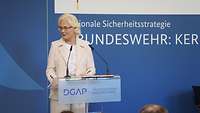
Security policy
A conversation about the National Security Strategy
First paragraph of the articleA multi-faceted debate on the National Security Strategy
After the Minister’s policy speech on the first National Security Strategy at an event hosted by the German Council on Foreign Relations (DGAP Deutsche Gesellschaft für Auswärtige Politik), a constructive and critical debate ensued. In a conversation with Guntram Wolff, Director of DGAP Deutsche Gesellschaft für Auswärtige Politik, Minister of Defence Christine Lambrecht elaborated further on her ideas.
The conversation with Mr Wolff was followed by a panel discussion moderated by Jana Puglierin, head of the Berlin office of the European Council on Foreign Relations. The panel discussion focused on the topic: “The 2022 paradigm shift: How can Germany meet the global security challenges credibly and sustainably?”
Panelists included Defence Minister Christine Lambrecht and Chief of Defence of the Bundeswehr Eberhard Zorn as well as Claudia Major, head of the International Security Research Division at the German Institute for International and Security Affairs (SWPStiftung Wissenschaft und Politik), and Christian Mölling, research director and head of the Security and Defence Programme at DGAP Deutsche Gesellschaft für Auswärtige Politik. The panel also addressed questions from the audience.
Comprehensive support for as long as necessary
Among the topical issues during the debate were matters pertaining to further support for Ukraine. The Minister said: “We are witnessing how important it is that the Ukrainian Army is fighting so valiantly”. Kyiv was going to receive comprehensive support from Germany in this endeavour for as long as necessary, Lambrecht underlined once again. Just this past weekend, she and the Chief of Defence, General Eberhard Zorn, had explored options to further support Ukraine. However, Lambrecht stated that the Bundeswehr was reaching its limits in providing further assistance to Ukraine. The Minister underlined that especially with regards to Western-made main battle tanks and infantry fighting vehicles, Germany would not act independently, and that there would only be joint decisions made by the allies. Minister Lambrecht made clear that she was not going to jeopardise Bundeswehr national and collective defence capabilities.
Reducing red tape in procurement
In addressing the topic of the discussion, i.e. how Germany could credibly and sustainably meet global security challenges, Bundeswehr procurement was one of the aspects of great interest. The Minister said that reducing red tape in procurement in the Bundeswehr was one of her main priorities. There was still a ways to go, but some progress had already been made. One of the first successes was a significant increase in the number of direct award procedures as a result of a recent simplification. In order to expedite procurement management, each and every ministerial directive on this topic was to be examined, the Minister said. About her experience with cutting back red tape she observed: “Our units have an incredible amount of expertise.” This is why there was no need for a large number of external consultants. Instead, Lambrecht considered it important that the Bundeswehr pursued unconventional paths in procurement. “I have a lot of plans”, Lambrecht said. Her goal was to eliminate as many obstacles for the Bundeswehr as possible.
Speedy materiel deliveries
The Chief of Defence of the Bundeswehr weighed in, saying that given the war in Ukraine and the resulting dramatic security changes in Europe, quick, “off the shelf” materiel procurement was the order of the day. At the moment, “perfect solutions” were not what mattered. Instead, gaps needed to be filled, for example in the area of air defence. The air force had already made remarkable progress in this field. Zorn added: “I am optimistic that we will get this done, but we need to be even faster.”
Germany has raised its profile
In closing, the Minister underlined that Germany and the Bundeswehr had stood the test in this time of crisis. Since the special fund for the Bundeswehr worth € 100 billion had been approved, Germany had raised its profile within the Alliance.

Share content on